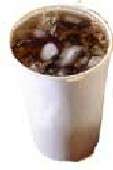Did extreme cola habit cause woman's irregular heartbeat?

(HealthDay)—Excessive soda consumption appeared to be the culprit in the case of a 31-year-old woman suffering from fainting spells and an irregular heartbeat after she spent more than half her life drinking only colas in place of water, a new study contends.
The reason behind her hospitalization was a dangerous drop in overall levels of potassium—a key mineral whose absorption by the body is aided by water but crippled in the face of excess sugar or caffeine consumption, the case study authors said.
Colas are typically high in both high-fructose corn syrup and caffeine, the Monaco-based researchers noted.
"[So] the first thing to highlight is that the case we reported is exceptional," said study lead author Dr. Naima Zarqane, a cardiologist at Princess Grace Hospital Centre in Monaco. "The patient had only drunk colas from the age of 15, and this is quite unusual."
"What is positive," Zarqane added, "is that once she stopped consuming colas, everything became normal again. So, there are no grounds for consumers to panic. Nevertheless, parents should be vigilant about their children's intake of colas."
The research team is scheduled to present the findings this week at a European Society of Cardiology meeting in Athens, Greece.
In a review of previous studies, the researchers found six other reported cases highlighting the ill health effects of excess cola consumption, which ran the gamut from skeletal muscle damage to cardiovascular complications. In one instance, the patient died.
In the new study of the woman with repeating fainting spells—officially known as "traumatic syncope"—a physical exam turned up no obvious smoking gun. The patient had no previously identified health issues, nor a family background of sudden death, and she was not taking any chronic medications.
However, blood tests soon revealed extremely low potassium levels—a condition called "hypokalemia"—while an electrocardiogram (EKG) revealed problematic heart rate patterns.
When asked about her diet, the patient noted that she had stopped drinking water at the age of 15, at which point she instead began to consume about two liters of cola per day.
After cola consumption was completely eliminated from her diet, the patient's potassium levels returned to normal, while her heart reverted to a healthy routine rhythm.
Zarqane and her associates surmised that her health issues were a direct result of excessive cola consumption, given that high levels of sugar can stop water absorption in the gut, prompting diarrhea and massive potassium loss. What's more, caffeine can similarly impede potassium absorption by sending kidney function out of whack.
But though the team advised that cardiologists be aware of complications linked to soda consumption, they acknowledged that "there is clearly a need for more research on the topic, as currently we have only seven case reports on the subject."
Because this study was presented at a medical meeting, the data and conclusions should be viewed as preliminary until published in a peer-reviewed journal.
For his part, Dr. Kishore Gadde, director of the obesity clinical trials program at Duke University Medical Center, said that it's important to understand that ultimately the key culprit here is not too-low consumption of potassium but rather the diarrhea that causes a high degree of potassium loss.
"It is extremely rare that people develop hypokalemia due to inadequate dietary intake of potassium," he noted. "Mostly, hypokalemia is caused by excessive loss of potassium," which is brought on by diarrhea, excessive sweating and undue use of laxatives or prescription diuretics, he said.
And in that light, Gadde suggested that too much caffeine intake could be just as problematic as too much sugar.
"People who consume very large quantities of coffee and other caffeinated beverages, especially the so-called 'energy drinks,' may be at risk of drop in blood levels of potassium," he cautioned.
Athletes are particularly vulnerable, Gadde said, given the excess sweating that accompanies vigorous activity. "(And) people who are trying to lose weight often switch from sugary beverages to diet beverages, which can also increase risk for lowering of potassium levels when consumed in large quantities due to cumulative increase in daily caffeine consumption," he said.
Moderation, he concluded, "is the key to consumption of sodas and other caffeinated beverages."
That point was seconded by Lona Sandon, a registered dietitian and an assistant professor of clinical nutrition at the University of Texas Southwestern at Dallas.
"Common sense and critical thinking should tell us that relying solely on soda for fluid intake is not healthy," Sandon said. "Heavy reliance on any one single food or beverage is not recommended."
More information: For more about healthy hydration, visit the U.S. Centers for Disease Control and Prevention.
Health News Copyright © 2013 HealthDay. All rights reserved.
















